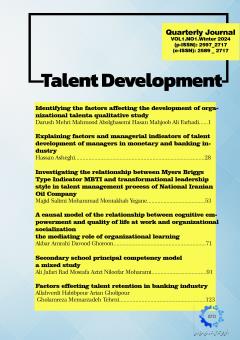Investigating the Relationship between of Myers-Briggs Type Indicator (MBTI) with Transformational Leadership Style in Talent Management Process of National Iranian Oil Company
Subject Areas : Patterns of human capital talent managementدکتر مجید سلیمی 1 , Mohammad Montakhab Yeganeh 2
1 -
2 -
Keywords: Personality Type Myers-Briggs, Transformational Leadership, Talent Management, Assessment Center,
Abstract :
Understanding and managing the unique talent, capability and characteristics of leaders who guide employees to achieve organizational goals is so important; because the leadership style they adopt is based on their personal preferences and characteristics. The purpose of this study was to investigate the relationship between Myers-Briggs type indicator (MBTI) and transformational leadership style. The sample of this study was selected through simple random sampling from all the managers of the National Iranian Oil Company (NIOC) who participated in the talent management process in the assessment center, between 2011 and 2019, and finally, 1045 people were selected as the sample. The research method was descriptive and correlational and Myers-Briggs Type Indicator (MBTI) scores were used with transformational leadership scores in interview process and game group process for perform the required analyzes. Cronbach's alpha method were used to evaluate the reliability of instruments. Findings showed that Myers-Briggs types indicator had a significant relationship with transformational leadership style so that the more extroversion, thinking and intuitive scores, the higher the leadership score. As result can help to select, choose and training transformational leaders by identifying personality preferences and types.
1. Sethuraman, K., & Suresh, J. Effective Leadership Styles. International Business Research. 2014; 7 (9): 165-172.
2. Hassan, H., Asad, S., Hoshino, Y. Determinants of Leadership Style in Big Five Personality Dimensions. Universal Journal of Management. 2016; 4(4): 161-179.
3. Western, S. Leadership: A Critical Text. Third Edition. SAGE Publications Ltd. London. 2019.
4. Piccolo, R. F., Greenbaum, R., Hartog, D. N. D., Folger, R. The relationship between ethical leadership and core job characteristics. Journal of Organizational Behavior. 2010; 31: 259-278.
5. Karamat A. U. Impact of Organizational Leadership on Organizational Performance. A Case Study of D & R Cambric Communication. Journal of Organizational Leadership. 2013;6(1):117-33.
6. Shokrkon, H., Shamsi, M., & Montakhab Yegane, M. The Effect of Transformational Leadership on Organizational Creativity with Mediating role of Organizational Trust and Moderating Role of Organization-Based Self-Esteem. Journal of Industrial and Organizational Psychology Studies. 2015; 2 (1): 37-56. [Persian].
7. Bass, B. M. Does the transactional-transformational leadership paradigm transcend organizational and national boundaries? American Psychologist. 1997; 52 (2): 130-139.
8. Bass, B. M., & Bass, R. The Bass handbook of leadership: Theory, research, and managerial applications (4th ed.). New York: Free Press. 2008.
9. Spector, P., Borman, W., & Cimino, C. Emotional intelligence and leadership styles. Department of Psychology College of Arts and Sciences, available at Shannon Webb. 2004.
10. Yan, B. Modeling the Effects of Innovative Leadership on Productivity and Profitability. Journal of Scientific and Industrial Research (JSIR). 2018; 77: 164-167.
11. Brown M. E., Trevin˜o L.K. Ethical leadership: A review and future directions. Leadership Quarterly. 2006; 17: 595–616.
12. Anderson C, Spataro S.E, Flynn F.J. Personality and organizational culture as determinants of influence. Journal of Applied Psychology. 2008; 93: 702– 710.
13. Hogan, R. In defense of personality measurement: New wine for old whiners. Human Performance. 2005; 18(4): 331–341.
14. Costa, P. T., & McCrae, R. R. Four ways five factors are basic. Personality & Individual Differences. 1992; 13(6): 653–665.
15. Nelis D, Kotsou I, Quoidbach J, Hansenne M, Weytens F, Dupuis P, Mikolajczak M. Increasing emotional competence improves psychological and physical well-being, social relationships, and employability. Emotion. 2011; 11(2): 354.
16. Maddocks J. How emotional intelligence measures can add value to users of type instruments. British Association for Psychological Type. Type Face. 2004;15(1):14-5.
17. Myers IB, McCaulley MH, Quenk NL, Hammer AL. MBTI manual: A guide to the development and use of the Myers-Briggs Type Indicator. Palo Alto, CA: Consulting Psychologists Press; 1998.
18. Brandt, T., & Laiho, M. Gender and personality in transformational leadership context. Leadership & Organization Development Journal. 2013; 34 (1); 44 – 66.
19. Almandeel, S. M. The mediating role of transformational leadership style on relationship between personality type and turnover intention in Saudi Arabian banking context. International Journal of Organizational Leadership. 2017; 6: 109-136.
20. Greasley, P. E., Bocârnea, M., C. The Relationship Between Personality Type and the Servant Leadership Characteristic of Empowerment. Social and Behavioral Sciences. 2014; 124 : 11 – 19.
21. Kedsuda, L., & Oganlana, S.O. Linking personal competencies with transformational leadership style. Journal of construction in developing countries. 2008; 13: 78-102.
22. Sieff, G. Carstens, L. The Relationship Between Personality Type And Leadership Focus. Journal of Human Resource Management. 2006; 4 (1): 52-62.
23. Bono, J. E & Judge, T.A. Personality and transformational and transactional leadership: A meta-analysis. Journal of Applied Psychology. 2004; 89(5): 901-910.
24. Mohammadi, S., Mohammadi, I., Moniri, S. M. Studying the relationship between personality types and leadership style. European Online Journal of Natural and Social Sciences. 2015; 4 (1): 303-317.
25. Bahreinian, M., Ahi, M., & Soltani, F. The Relationship Between Personality Type And Leadership Style Of Managers: A Case Study. Mustang Journal of Business & Ethics. 2012; 3: 94-111.
26. Ghandadi, A., Tondnevis, F., & Kalani, A. The Relationship Among Transformational And Transactional Leadership Styles And Personality Of Physical Education (P.E) Faculty Manager`S In Iranian Universities. Journal of Research in Sports Management and Motor Behavior. JRSM. 2014; 4 (8) :49-61. [Persian].
27. Mahmoudi Kia, M., Baharlou, M., & Arshadi, N. Investigating The Relationship Of Personality Characteristics With Ethical Leadership. Journal of Ethic in Science and Technology. 2014; 9(3): 1-11. [Persian].
28. Taghavi GharehBolagh, H., Vaezi, M., & Kharazi, K. The Five Dimensions Of Personality Framework For Predicting Transformational Leadership In Educational Settings. Modern Thoughts in Education. 2013; 32: 64-80. [Persian].
29. Fleenor, J. W. Trait Approach to Leadership. Encyclopedia of Industrial and organizational Psychology. SAGE Publication. 2011.
30. Mitchell, T. R. People In Organization: Understanding Their Behavior, translated by Shokrkon, Hossein. 5th edition, Roshd: Tehran. 2016.


